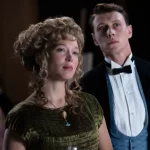Final Portrait: Out of the Loop, by David Bax
There’s a reason you don’t see many farces shot in the desaturated, shaky camera style that’s come to define so much of 21st century cinema. Sure, Armando Iannucci pulled off the juxtaposition with In the Loop and his preceding television series, The Thick of It. But generally such a classical form of comedy is best served by a classical approach. Director Stanley Tucci knows this, based on his early films. That’s why it’s such a disappointing surprise that Final Portrait, his biopicish new movie about artist Alberto Giacometti that seems intended to be at least partly a frenzied comedy, is so drab and inert.
In Paris in 1964, American writer James Lord (Armie Hammer) meets Giacometti (Geoffrey Rush) and agrees to sit for a portrait. Lord only has a couple of days before he’s scheduled to fly home but Giacometti assures him that will be plenty of time. The artist then spends most of his time chain smoking cigarettes, downing glasses of wine in one gulp and arguing with nearly everyone who enters his vicinity (including Lord and, often, the portrait itself) with the exception of Caroline (Clémence Poésy), his prostitute muse, whom he plies with gifts while mollifying her pimps with drastic overpayments. This doesn’t tend to sit well with Giacometti’s wife, Annette (Sylvie Testud) but at least it seems to amuse Lord, even though, as the weeks drag on, he has to keep calling the airline to change his reservation and call whoever’s waiting for him back home to give them the bad news that he’ll be staying a little longer.
One of Giacometti’s typically curmudgeonly but insightful statements is that, since the invention of photographs, portraits no longer have meaning. What he really means is that painted portraiture must endeavor to take on meaning beyond representation. Tucci, who is making a portrait of his own and even calling it one in the title, includes this bit of meta-commentary perhaps as an explanation for why he’s made a swinging door comedy out of it but he can’t account for why his story still feels so familiar.
Tucci does manage to fit in the occasional grace note. One wordless scene, wholly independent from the narrative, depicts Lord simply going for a swim. Tucci builds increasingly layered dissolves into the moment, abstracting Lord and the rippling water from reality until the audience emerges, much like Lord, with our equilibrium reset.
Beats like that one are far too few in Final Portrait. That’s not to say the remainder of the movie is homogenous, though. Rather, it’s varied in ways that are less beneficial. Lord’s narration, for example, is distractingly sporadic. It keeps going away just long enough for you to forget about it, then starts up again out of nowhere, jarringly.
Still, the lion’s share of Final Portrait consists of Giacometti being cantankerous. The two most common victims of his tirades are his brother Diego (Tony Shalhoub) and his wife, both of whom are almost always in the right. Most likely, Tucci is saying something about how Giacometti’s imperviousness to reason and rationality are necessary for him to succeed at his impractical vocation. But do we really need another argument in favor of tolerating and accommodating miserable, abusive artists because they may be geniuses?





























